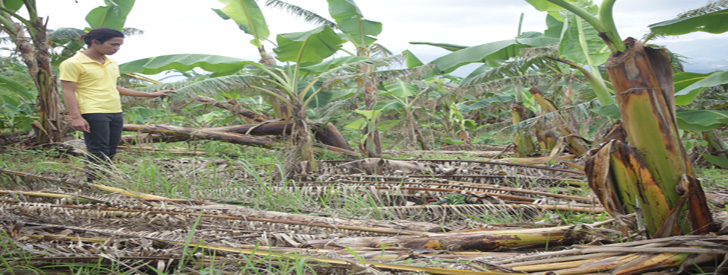 Jehusam Barrera, a member of the Cofcavil Banana Producers' Association Cooperative in Madella, Quirino shows a damaged banana plantation in their area brought by Typhoon Lando which hit the country in October. Under the DA-PRDP, farmers' and fishers' groups affected can now propose for small livelihood sub-projects to help them rehabilitate lost livelihoods brought by the typhoon. (Photo by: Kathrino Resurreccion, DA-PRDP)
Jehusam Barrera, a member of the Cofcavil Banana Producers' Association Cooperative in Madella, Quirino shows a damaged banana plantation in their area brought by Typhoon Lando which hit the country in October. Under the DA-PRDP, farmers' and fishers' groups affected can now propose for small livelihood sub-projects to help them rehabilitate lost livelihoods brought by the typhoon. (Photo by: Kathrino Resurreccion, DA-PRDP) DA-PRDP to allow small livelihood projects in Lando-affected areas
To help farmers and fishers in North Luzon recover from the damage brought by Typhoon Lando, the Philippine Rural Development Project of the Department of Agriculture (DA-PRDP) will now accept proposals for small livelihood projects (SLPs) in these regions.
The SLPs, proposed by local government units (LGUs), aims to help farmers and fishers recover lost or damaged livelihoods in areas affected by calamities such as typhoons and earthquakes. These livelihood projects will be implemented under the Enterprise Development (I-REAP) component of the PRDP.
PRDP National Deputy Project Director Arnel de Mesa explained that unlike other sub-projects proposed under the I-REAP component, SLPs require less stringent measures for approval.
“For instance, newly established agri-based cooperatives and associations are allowed to be proponent groups for SLPs that cost up to a maximum of P1 million,” de Mesa said.
He clarified though that just like the other enterprise development sub-projects proposed under the PRDP, 20% equity of the provincial or municipal government is required.
“These SLPs are short-gestating projects so affected farmers and fishers can easily bounce back from their losses,” de Mesa added.
Meanwhile, Agriculture Chief Proceso Alcala said that it would be ideal for these PGs to propose for assistance on the production and marketing of high value crops widely grown in the areas of Luzon.
“As we have established trading centers in some of areas in North Luzon including Benguet and Isabela, farmers will have a market where they can deliver their produce,” Alcala said.
The DA has been constructing trading centers in strategic places across the country to serve as hubs for producers and buyers, reducing layers of middlemen.
De Mesa said that proposed SLPs do not require PRDP tools such as the Value Chain Analysis (VCA) and Provincial Commodity Investment Plan (PCIP) to be approved, since the goal of SLPs is to help farmers and fishers quickly recover from losses due to calamities.
The VCA is a tool used to assess the status, and the linkages and interplay of different value chain players of a particular industry. The results of the assessment will then be used to identify appropriate upgrading strategies and interventions that will contribute to the development and strengthening of the subject industry’s competitive advantage.
From the VCA, Provincial Local Government Units will then craft a PCIP, which is a strategic three-year rolling plan containing possible interventions to be undertaken by a province for priority commodities in support of the national Agriculture and Fisheries Modernization Plan (AFMP) and the localized regional AFMP.
Four SLPs amounting to almost P3 million have been approved in Visayas under the PRDP.
De Mesa said that for municipalities in Visayas affected by Typhoon Yolanda and the 2013 7.3-magnitude earthquake, proposals for SLP are extended until 2016.
Aside from calamity-stricken areas, SLPs are also accessible in conflict-stricken areas in Mindanao.
The PRDP is a six-year project funded through a loan from World Bank, with equities from the national government and local government units. It is the government’s main platform for rural development that aims to improve rural economy by operationalizing local-level convergence among agricultural stakeholders, synergizing programs and projects for modern, climate-smart and market-oriented agro-fishery sector that benefits the greater segment of farmers and fishers. (Catherine Nanta, DA-PRDP)
